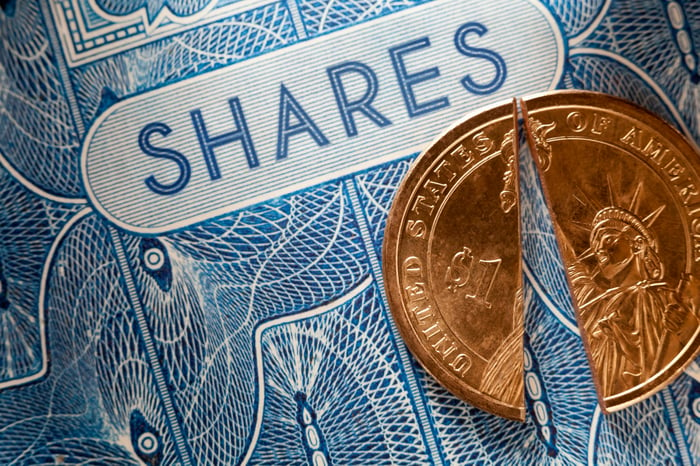For more than two years, the rise of artificial intelligence (AI) has been the hottest trend on Wall Street, and the primary catalyst that lifted the Dow Jones Industrial Average, S&P 500, and Nasdaq Composite to new heights. But it's not the only factor that's played a pivotal role in exciting investors.
In 2024, professional and everyday investors flocked to companies enacting stock splits.
A stock split is an event that allows a publicly traded company to cosmetically alter its share price and outstanding share count. What makes a stock split "cosmetic" is that these events have no impact on a company's market cap or its underlying operating performance.

Image source: Getty Images.
Stock splits come in two varieties, with investors favoring one far more than the other. Reverse splits, which are designed to increase a company's share price, are the less-popular of the two. Businesses conducting reverse splits are typically doing so from a position of operating weakness and attempting to avoid delisting from a major stock exchange.
On the other hand, the investment community tends to love companies completing forward stock splits. A forward split aims to lower a company's nominal share price, with the goal of making its shares more nominally affordable to everyday investors who can't purchase fractional shares through their broker. Businesses enacting forward splits are usually out-executing their competition and on the leading edge of the innovative curve within their respective industry.
Following more than one dozen high-profile stock splits in 2024, the big question on the minds of investors is: Which stock will be Wall Street's first blockbuster stock-split stock of 2025?
There's more to a stock split than just a high share price
Through nearly three months of 2025, there have been dozens of reverse splits and a select few forward-split announcements. However, none of these announcements have come from market-leading businesses.
When attempting to figure out which stock(s) are ripe for a split, there's more to consider than just share price. For instance, the boards of some companies have no interest in conducting a split. Examples include Warren Buffett's Berkshire Hathaway -- a single Class A share (BRK.A) will set you back nearly twice the amount of the median home price in the U.S. -- and homebuilder NVR. No matter how much their respective shares climb, neither seem interested in conducting a split.
The other key component is non-institutional ownership. If a large percentage of a company's outstanding shares is owned by institutional money managers, there's not much of an impetus to reduce its share price. In other words, institutional investors have the capital handy to buy whole shares.
High institutional ownership is why a number of well-known companies aren't exactly champing at the bit to split their stock. Auto-parts supplier AutoZone, streaming service Netflix, and credit analytics company FICO closed out the previous week at $3,606.34, $960.29, and $1,853.29, respectively. But these three companies have retail investor ownership of just 10.1%, 19.4%, and 12.8% (in the same order as listed).
The less of a retail presence a stock has, the less likely it is that a company's board of directors will push for a split.

Image source: Getty Images.
This "Magnificent" company is primed for its first-ever stock split
But there is one game-changing company with a notably higher percentage of retail ownership that can become the first blockbuster stock-split stock of 2025 -- and it would mark its first-ever split, should one be announced.
While every other member of the "Magnificent Seven" has, at one time or another, completed a stock split, social media giant Meta Platforms (META 14.45%) has never undertaken one. With its share price currently hovering around $600, and retail investor ownership approaching 29%, the logical time to announce a stock split has arrived.
Thanks to Meta's assortment of competitive advantages, the needle for its stock is pointing higher over the long run.
For instance, Meta attracted an average of 3.35 billion daily active people to its family of apps in December. These apps include Facebook, Instagram, WhatsApp, Facebook Messenger, and Threads, among others. Since no other social media platform comes particularly close to luring as many eyeballs daily as Meta's family of apps, it typically commands strong ad-pricing power. Last year, average price per ad rose by 10%.
NASDAQ: META
Key Data Points
Meta is also able to take advantage of the nonlinearity of economic cycles. Despite recessions being normal and inevitable, they're historically short-lived. With Meta generating in the neighborhood of 98% of its net sales from advertising, it benefits from the average economic expansion lasting for roughly five years since the end of World War II.
Don't forget that Meta Platforms is a key player in the AI revolution, as well. Whereas most tech companies are still struggling to generate a positive return on their AI investments, Meta is incorporating generative AI that allows businesses to tailor their message(s) to specific users. In other words, it's already seeing positive returns from its use of AI.
But there's more to the evolution of AI than just bolstering the company's advertising capabilities. This game-changing technology is expected to play a key role in the long-term development of the metaverse -- the 3D virtual world where people can interact with each other and their surroundings. Meta is angling to be a key on-ramp to these virtual interactions.
Last but not least, Meta Platforms has a treasure chest to continually invest in high-growth initiatives and sustain its social media dominance. It closed out 2024 with $77.8 billion in cash, cash equivalents, and marketable securities, and generated north of $91.3 billion in net cash from operating activities last year. It has the luxury of taking risks that most companies lack.
A rock-solid operating model and notable retail ownership are the perfect combination to make Meta Platforms 2025's first blockbuster stock-split stock.





